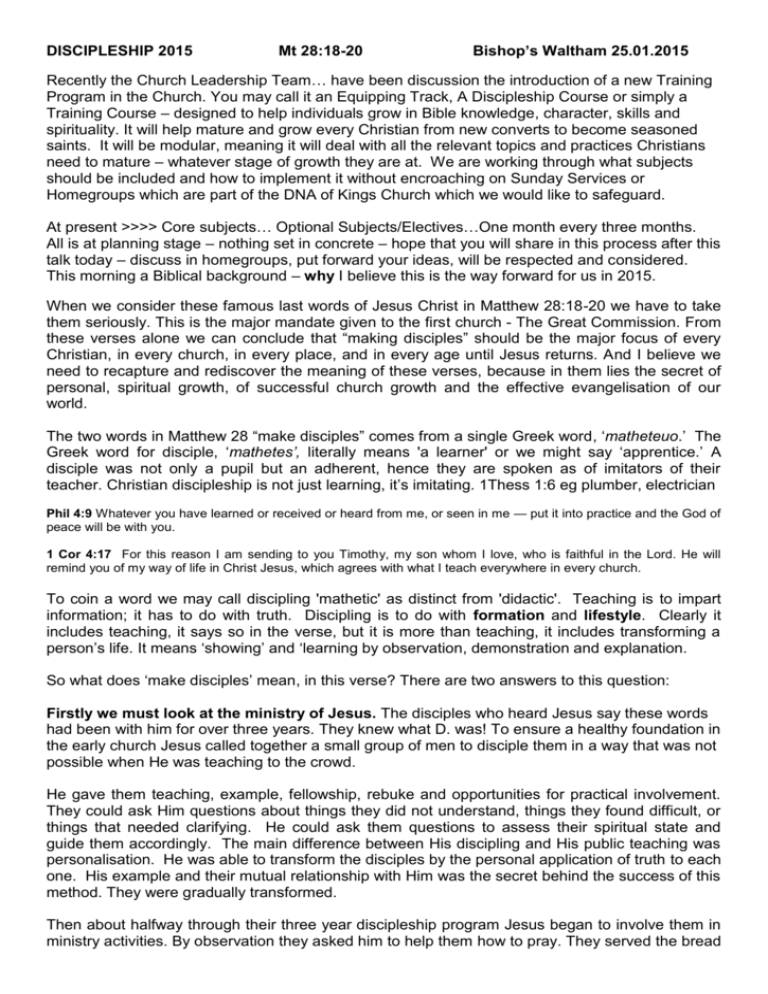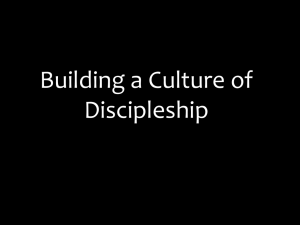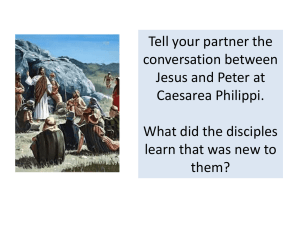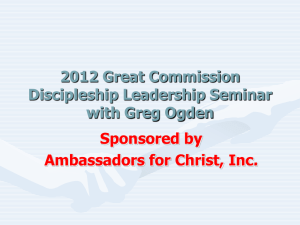Notes - King`s Church Bishops Waltham
advertisement

DISCIPLESHIP 2015 Mt 28:18-20 Bishop’s Waltham 25.01.2015 Recently the Church Leadership Team… have been discussion the introduction of a new Training Program in the Church. You may call it an Equipping Track, A Discipleship Course or simply a Training Course – designed to help individuals grow in Bible knowledge, character, skills and spirituality. It will help mature and grow every Christian from new converts to become seasoned saints. It will be modular, meaning it will deal with all the relevant topics and practices Christians need to mature – whatever stage of growth they are at. We are working through what subjects should be included and how to implement it without encroaching on Sunday Services or Homegroups which are part of the DNA of Kings Church which we would like to safeguard. At present >>>> Core subjects… Optional Subjects/Electives…One month every three months. All is at planning stage – nothing set in concrete – hope that you will share in this process after this talk today – discuss in homegroups, put forward your ideas, will be respected and considered. This morning a Biblical background – why I believe this is the way forward for us in 2015. When we consider these famous last words of Jesus Christ in Matthew 28:18-20 we have to take them seriously. This is the major mandate given to the first church - The Great Commission. From these verses alone we can conclude that “making disciples” should be the major focus of every Christian, in every church, in every place, and in every age until Jesus returns. And I believe we need to recapture and rediscover the meaning of these verses, because in them lies the secret of personal, spiritual growth, of successful church growth and the effective evangelisation of our world. The two words in Matthew 28 “make disciples” comes from a single Greek word, ‘matheteuo.’ The Greek word for disciple, ‘mathetes’, literally means 'a learner' or we might say ‘apprentice.’ A disciple was not only a pupil but an adherent, hence they are spoken as of imitators of their teacher. Christian discipleship is not just learning, it’s imitating. 1Thess 1:6 eg plumber, electrician Phil 4:9 Whatever you have learned or received or heard from me, or seen in me — put it into practice and the God of peace will be with you. 1 Cor 4:17 For this reason I am sending to you Timothy, my son whom I love, who is faithful in the Lord. He will remind you of my way of life in Christ Jesus, which agrees with what I teach everywhere in every church. To coin a word we may call discipling 'mathetic' as distinct from 'didactic'. Teaching is to impart information; it has to do with truth. Discipling is to do with formation and lifestyle. Clearly it includes teaching, it says so in the verse, but it is more than teaching, it includes transforming a person’s life. It means ‘showing’ and ‘learning by observation, demonstration and explanation. So what does ‘make disciples’ mean, in this verse? There are two answers to this question: Firstly we must look at the ministry of Jesus. The disciples who heard Jesus say these words had been with him for over three years. They knew what D. was! To ensure a healthy foundation in the early church Jesus called together a small group of men to disciple them in a way that was not possible when He was teaching to the crowd. He gave them teaching, example, fellowship, rebuke and opportunities for practical involvement. They could ask Him questions about things they did not understand, things they found difficult, or things that needed clarifying. He could ask them questions to assess their spiritual state and guide them accordingly. The main difference between His discipling and His public teaching was personalisation. He was able to transform the disciples by the personal application of truth to each one. His example and their mutual relationship with Him was the secret behind the success of this method. They were gradually transformed. Then about halfway through their three year discipleship program Jesus began to involve them in ministry activities. By observation they asked him to help them how to pray. They served the bread at the feeding of the 5000 and 4000 and had a ringside seat at these miracles. They were sent out on ministry trips, preaching the kingdom of God, healing the sick and casting out demons. Each time they reported back to him to debrief, or to ask questions. “Why couldn’t we cast this one out?” “Why do you teach in parables?” “Can you explain this please?” Jairus’ Dght. Mk 5:35ff, Acts 9:36 It took three years for the first disciples to be instructed in the truth and to develop a ministry lifestyle. Four times in the book of Acts the writer refers to the Christian life as The Way because that’s what it is - a way of life, a lifestyle. They were so much like Jesus that in Acts 4:13 it says ‘When they saw the courage of Peter and John and realised that they were unschooled, ordinary men, they were astonished and they took note that these men had been with Jesus.’ This is discipleship! Now, it is always tempting to say things like “I wish I had been there as one of Jesus disciples and had my life transformed like the first ones.” The truth is we can. Let’s go on. Secondly we must consider the ministry of the early church. What did the disciples do as a response to this command of Jesus? Well, as soon as they were filled with the Holy Spirit they began to preach the gospel and people were saved. Not only were they saved but they were “added to the church.” This is important because making disciples means more than getting people saved. Jesus said discipleship included baptism and obedience to all of Christ’s teachings. Of course being saved was important. It was the beginning of a new transforming lifestyle! So new converts were baptised, added to (initially) small communities where they could be taught, be transformed and be trained to serve the Lord themselves. We could say that the major focus of Christians or the church, at least in Jesus mind, was to make disciples who could make disciples who could make disciples and affect the world for our Saviour! This was Jesus Master Plan and it was a plan that has never been rescinded - and never will be. How can we define discipleship today? Discipleship sums up the Christians major focus. Definition: An intentional training of disciples in knowledge (Bible), character, skills and spirituality, in an environment of accountability and loving relationships. Okay? And I believe we have to ask ourselves the question, “Is what we are doing in church today a true reflection of Jesus teaching?” Have we become satisfied with, and accustomed to, something less than what Jesus intended? Have we reduced Christianity to “being saved,” church attendance, singing songs of worship and having pleasant relationships with other believers? "Christians in the West have largely neglected what it means to be a disciple of Christ. The vast majority of Western Christians are church-members, pew-fillers, hymn-singers, sermon-tasters, Bible-readers, born-again believers or charismatics - but not true disciples of Jesus. If we were willing to learn the meaning of true discipleship and to actually become disciples, the church in the West would be transformed, and the resultant impact upon society would be staggering" David Watson. “A program to develop the new Christian is one of the greatest needs of the 21st century church” The Book of Acts I am always astonished when I re-read the book of Acts. To think that 120 Jews who were ostracised by their own countrymen and victimised by the ruling Roman Empire, managed to plant a living, vibrant and powerful church. The gospel spread like a forest fire from Jerusalem to every part of the Roman Empire within a few years, in a spiritually hostile world. And what was the key to it? Discipleship! Each member doing its part. Justin Martyr, a philosopher who was won to faith in Christ early in the second century, wrote: There is not a single race of men, whether among barbarians or Greeks or by whatever name they may be called, of those who live in wagons or are called Nomads or of herdsmen living in tents, among whom prayers and thanksgiving are not offered through the name of the crucified Jesus to the Father and Maker of all things. What was the key to this? Discipleship! The lawyer Tertullian at the end of the second century recorded that "we are but of yesterday, and we have filled every place among your cities, islands, fortresses, towns, marketplaces, the very camps, tribes, companies, palace, senate, and forum. We have left you only the temples."'… Historians tell us that by A.D. 323 approximately 10 percent of the Roman Empire's population, some 10 million out of about 100 million, had been won to the new faith. The gospel had also spread beyond the bounds of the empire into the Tigris and Euphrates valleys, along the shores of the Black Sea, into Armenia and Arabia, and even into India. Kenneth Scott Latourette, the great church historian, has written: Never in so short a time has any other religious faith, or, for that matter, any other set of ideas, religious, political, or economic, without the aid of physical force or of social or cultural prestige, achieved so commanding a position in such an important culture.'… And as we look across the world today and observe those hotspots of Christian growth and advance we see the same. Virtually every major advance in the world today in the Christian church has discipleship as its focus. I could refer to scores of places around the world today where the church has reached phenomenal levels of health and growth. I’m talking of South America, parts of Africa, northern India and the Far East. But let me confine myself to personal experience. When Elizabeth and I were in Thailand in the year 2000 we visited a church movement which had planted seven or 800 churches in 17 years - in a Buddhist environment! The secret? Discipleship! A couple of years later we went to Bogota, Colombia and visited a church service in a football stadium that was crammed with Christian worshippers - even the playing field was filled with seats! The church has something like four or 500,000 members. What was the focus of ministry? Discipleship! Are we missing something here? Do we need to bring our church life in line with Jesus command? Let’s move on now to another passage in the New Testament, Ephesians 4:11-12 The book of Ephesians is essentially a letter about the church and for the church. Here Paul notes five specific ministries that have been given to the church to prepare God’s people for works of service, so that the body of Christ may be built up. Their job spec is clear, they are not to do everything in the church, rather they are to prepare God’s people for works of service and to build up the body of Christ. This is discipleship at local church level. Remember Paul’s analogy of the church in Corinthians 12. The church is a body with many members and the leaders’ job is to encourage, exhort, train and coach the members of the team to do their job - not to do it for them - nor just to give them a pep talk on a Sunday morning! Now wouldn’t that be fun, to be part of the church where you could serve in one capacity or another - spiritually, practically, in prayer, by evangelism, by teaching, being on the welcome team, leading a small group, counselling someone with relational problems, or addictive problems, or with deep emotional scars, praying for the sick or demonised, or cleaning the loos. Church leaders used to talk about the 80/20 divide. "20% doing the work while 80% did nothing except attend meetings. I compared it with a football match - 22,000 people desperately needing exercise watching 22…rest. And then there’s that little poem about the church: Mary had a little lamb, It would have been a sheep, But it joined a local Church, And died through lack of sleep. Whenever I said that in church people laugh - because it was true! Imagine how this would improve the quality of our life together. And it would be much more fun to be where the action is. All this begs the question: how are we going to disciple people? To obey the great commission? I have thought about this for a long time and have scoured the NT for some clues as to how we could adopt an intentional discipleship program to help us all grow in knowledge, character, skills and spirituality. Surprisingly, there are quite a number of passages in the New Testament which imply that a structured discipleship was adopted and in use. Heb 6:1-2 Therefore let us leave the elementary teachings about Christ and go on to maturity, not laying again the foundation of repentance from acts that lead to death, and of faith in God, instruction about baptisms, the laying on of hands, the resurrection of the dead, and eternal judgment. Did you hear about the young camel, who said to his mother, “Mummy, why do I have these huge feet?” The mother camel answered, “Well, we’ve got these big feet so that we can travel across the desert sand without sinking.” So the young camel said, “But mummy, why do we have these big humps?” and the mother said, “Well we’ve got these big humps so that we can store lots of water and we can travel for days and days across the desert.” And then the young camel said, “But mummy, why do we have these long eye lashes?” and the mother camel said, “Well they’re to keep the sand out of your eyes”. At which the baby camel said, “But mummy, why do we live in a zoo?” Matt Small Source unknown. 1 Cor 4:17 For this reason I am sending to you Timothy, my son whom I love, who is faithful in the Lord. He will remind you of my way of life in Christ Jesus, which agrees with what I teach everywhere in every church. 1 Cor 11:2 I praise you for remembering me in everything and for holding to the teachings, just as I passed them on to you. 2 Thess 2:15 So then, brothers, stand firm and hold to the teachings we passed on to you, whether by word of mouth or by letter. 2 Tim 2:2 And the things you have heard me say in the presence of many witnesses entrust to reliable men who will also be qualified to teach others. 1 Cor 7:17, 1 Tim 4:6, 2 Thess 3:6 We can safely conclude that NT ministries had a “body of teachings” which they used to train new believers and build strong churches. This was how they practised discipleship. This is why I believe our task, hear at Kings Church, Bishops Waltham, is to develop a Discipleship Training Track which includes all the essential teachings and practices to take a person from conversion to spiritual maturity. To make available to any believer in our care, whatever stage they are in the Christian life, opportunities to grow in knowledge character skills and spirituality. As we discuss this issue please pray for us! Discuss it in you homegroup, make suggestions regarding content and frequency and make a decision that you don’t want to miss out on what could be the greatest expression of Christianity in terms of health and effectiveness that any of us have ever seen in UK! And decide what you would like to go on: The Discovery Course, The Church Membership Class, The Foundations Course, The Encounter Course, HG Leaders Training, Prayer, Evangelism, Healing, Teaching – whatever.









